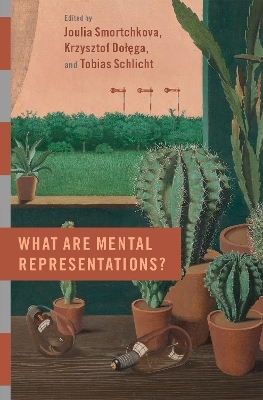
What are Mental Representations?
Oxford University Press Inc (Verlag)
978-0-19-068667-3 (ISBN)
The topic of this book is mental representation, a theoretical concept that lies at the core of cognitive science. Together with the idea that thinking is analogous to computational processing, this concept is responsible for the "cognitive turn" in the sciences of the mind and brain since the 1950s. Conceiving of cognitive processes (such as perception, reasoning, and motor control) as consisting of the manipulation of contentful vehicles that represent the world has led to tremendous empirical advancements in our explanations of behaviour. Perhaps the most famous discovery that explains behavior by appealing to the notion of mental representations was the discovery of 'place' cells that underlie spatial navigation and positioning, which earned researchers John O'Keefe, May-Britt Moser, and Edvard I. Moser a joint Nobel Prize in 2014. And yet, despite the empirical importance of the concept, there is no agreed definition or theoretical understanding of mental representation. This book constitutes a state-of-the-art overview on the topic of mental representation, assembling some of the leading experts in the field and allowing them to engage in meaningful exchanges over some of the most contentious questions. The collection gathers both proponents and critics of the notion, making room for debates dealing with the theoretical and ontological status of representations, the possibility of formulating a general account of mental representation which would fit our best explanatory practices, and the possibility of delivering such an account in fully naturalistic terms. Some contributors explore the relation between mutually incompatible notions of mental representation, stemming from the different disciplines composing the cognitive sciences (such as neuroscience, psychology, and computer science). Others question the ontological status and explanatory usefulness of the notion. And finally, some try to sketch a general theory of mental representations that could face the challenges outlined in the more critical chapters of the volume.
Joulia Smortchkova is a philosopher of cognitive science, working at the University of Oxford as a postdoctoral fellow. She completed her PhD at the Jean Nicod Institute with a thesis on the social contents of perception. She works on social cognition, metacognition, mental representations, types of explanation and natural kinds in psychology. Krzysztof Dołęga is currently a postdoctoral researcher at the Ruhr-Universität Bochum, where he previously completed his PhD under the supervision of Tobias Schlicht and Daniel Dennett. His research interests cluster around topics such as consciousness, mental representation, computational explanation, and models of explanation more generally. Tobias Schlicht is Professor of Philosophy at the Ruhr-Universit¨ Bochum with an interdisciplinary interest in consciousness and cognition. He wrote two books on the mind-body problem and social cognition and published numerous papers on consciousness, cognition and the foundations of cognitive science.
Preface
1. Introduction
Joulia Smortchkova, Krzysztof Do/lrega, and Tobias Schlicht
2. A Deflationary Account of Mental Representation
Frances Egan
3. Defending Representation Realism
William Ramsey
4. Deflating Deflationism about Mental Representation
Dan Hutto & Erik Myin
5. Representing as Coordinating with Absence
Nico Orlandi
6. Reifying Representations
Michael Rescorla
7. Situated Mental Representations: Why we need mental representations and how we should understand them
Albert Newen and Gottfried Vosgerau
8. Representational Kinds
Joulia Smortchkova and Michael Murez
9. Functionalist Interrelations Amongst Human Psychological States Inter Se, ditto for Martians
Nicholas Shea
10. Nonnatural Mental Representation
Gualtiero Piccinini
11. Error Detection and Representational Mechanisms
Krystyna Bielecka and Marcin Mi/lkowski
Index
| Erscheinungsdatum | 13.10.2020 |
|---|---|
| Reihe/Serie | Philosophy of Mind |
| Verlagsort | New York |
| Sprache | englisch |
| Maße | 236 x 152 mm |
| Gewicht | 635 g |
| Themenwelt | Geisteswissenschaften ► Philosophie |
| Geisteswissenschaften ► Psychologie ► Allgemeine Psychologie | |
| Geisteswissenschaften ► Psychologie ► Biopsychologie / Neurowissenschaften | |
| Geisteswissenschaften ► Psychologie ► Verhaltenstherapie | |
| ISBN-10 | 0-19-068667-7 / 0190686677 |
| ISBN-13 | 978-0-19-068667-3 / 9780190686673 |
| Zustand | Neuware |
| Informationen gemäß Produktsicherheitsverordnung (GPSR) | |
| Haben Sie eine Frage zum Produkt? |
aus dem Bereich


